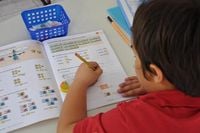The North Rhine-Westphalia (NRW) government is making significant strides in enhancing the educational framework for primary school students by increasing the teaching hours dedicated to German and mathematics. This initiative, which received official approval on March 20, 2025, from the School Committee of the NRW Parliament, is a response to alarming findings from the PISA study, which revealed that too many children and adolescents struggle with basic literacy and numeracy skills.
Beginning in the 2025/26 school year, all primary schools in NRW will allocate an additional hour per week to both German and mathematics classes. This measure will result in a total of five to six hours of instruction in these essential subjects for grades 1 through 4. NRW Education Minister Dorothee Feller emphasized the urgency of this change, stating, "Leistungsstudien wie PISA und IQB sind für Nordrhein-Westfalen ein glasklarer Handlungsauftrag. Viel zu viele Kinder und Jugendliche können nicht gut lesen, schreiben und rechnen. Das müssen, wollen und werden wir ändern!" (Performance studies like PISA and IQB are a clear mandate for action in North Rhine-Westphalia. Too many children and adolescents cannot read, write and calculate well. We must, want to, and will change this!).
The decision to restructure the curriculum stems from the desire to bolster foundational skills among young learners. The amendment to the training regulations for primary schools mandates that two previously flexible support hours are now permanently assigned as dedicated instructional time for German and mathematics. Feller noted, "Um erfolgreich im Unterricht mitarbeiten zu können, müssen unsere Schülerinnen und Schüler von Beginn an lernen, gut zu lesen, zu schreiben und zu rechnen. Dafür geben wir ihnen nun mehr Zeit zum Üben, Wiederholen und Vertiefen." (To successfully participate in class, our students must learn to read, write, and calculate well from the very beginning. Therefore, we are now giving them more time to practice, review, and deepen their knowledge).
This reform aligns with the broader goals set forth by the Kultusministerkonferenz, which aims to improve educational practices across German states. The initiative not only addresses academic performance but also emphasizes the importance of individualized support for all students. Schools are encouraged to break down classes into smaller groups to ensure that each child receives the attention they need to thrive.
To assess the current learning levels of children, the NRW Ministry of Education previously conducted a digital screening at over 100 primary schools. This approach, implemented in the previous autumn, allows educators to evaluate student capabilities right at the point of school enrollment. The intention to roll out digital tools for this purpose further underscores the commitment to improving educational outcomes.
Moreover, in the upcoming school year (2023/24), the Ministry will implement mandatory reading time, which comprises three sessions of 20 minutes each per week for all primary school-age children. Feedback from schools regarding this initiative has been overwhelmingly positive, suggesting an eagerness among educators and students alike for increased focus on literacy.
NRW is not stopping at merely increasing instructional hours for the core academic subjects. Feller insists that fostering social and emotional competencies is equally critical. This holistic approach is reflected in the retention of arts, music, and physical education within the curriculum. “Genauso wichtig wie das Lesen, Schreiben und Rechnen,” (Just as important as reading, writing, and calculating) she noted, is the development of students’ social skills.
In addition to the more rigorous schedule for German and mathematics, NRW schools are equipped with additional programs and digital resources aimed at fostering these fundamental skills. Tools like "divomath" and the digital reading platform





